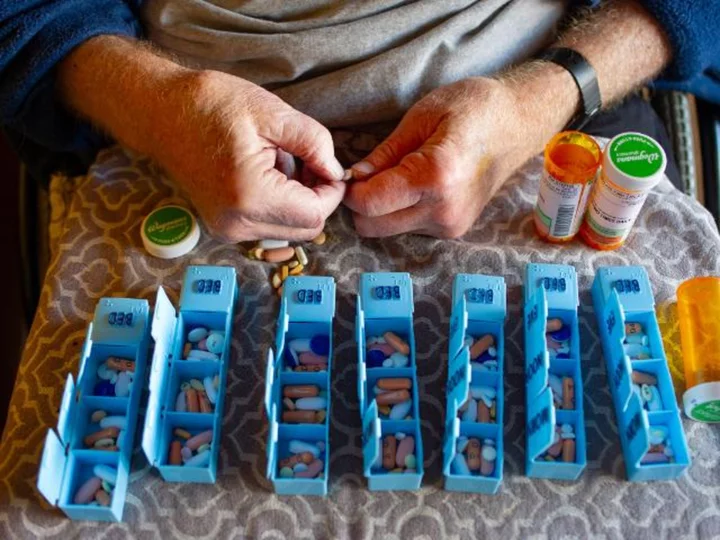Drugmakers' leading industry group is the latest to file a lawsuit seeking to stop Medicare's newly granted power to negotiate drug prices.
In a suit filed Wednesday in the US District Court for the Western District of Texas, the Pharmaceutical Research and Manufacturers of America, known as PhRMA, along with the National Infusion Center Association and the Global Colon Cancer Association, argue that the negotiation provision is unconstitutional in several ways.
It does not provide for checks and balances through public feedback and cuts off administrative and judicial review, which violate the Constitution's separation of power and due process clauses, the challengers say. They also argue the provision includes an "extreme" excise tax aimed at forcing manufacturers to accept the government-mandated price, making it an excessive fine prohibited by the Eighth Amendment.
The trio's lawsuit joins others by Merck, Bristol Myers Squibb and the US Chamber of Commerce that are trying to overturn the controversial provision, which was part of the Inflation Reduction Act that congressional Democrats approved last summer.
The Biden administration has said that the Constitution does not prevent Medicare from negotiating drug prices. Legal experts have generally agreed.
Historic new power for Medicare
The new provision allows the Health and Human Services secretary to negotiate the prices of 10 drugs for 2026, and another 15 drugs for 2027 and again for 2028. The number rises to 20 drugs a year for 2029 and beyond. Only medications that have been on the market for several years without competition are eligible.
In the first two years of negotiations, the Centers for Medicare and Medicaid Services will select only Part D drugs that are purchased at pharmacies. It will add Part B drugs, which are administered by doctors, to the mix for 2028.
The agency outlined in March how the negotiation process will proceed and launched a 30-day comment period on key implementation elements. It will publish the first 10 Part D drugs selected for negotiation on September 1 and give their manufacturers a month to decide whether to sign agreements to participate.
The agency will send an initial maximum fair price offer to manufacturers on February 1, 2024. Drug companies have 30 days to accept the offer or propose a counteroffer. Up to three in-person meetings may be held during the negotiation period, which ends June 30, 2024.
CMS will make a final written offer by July 15, 2024, which drugmakers must either accept or reject by the end of the month. The agency will publish the negotiated maximum fair prices on September 1, 2024, and they will become effective at the start of 2026.
The initial set of drugs will be chosen from the top 50 Part D drugs that are eligible for negotiation that have the highest total expenditures in Medicare. CMS will consider multiple factors when developing its initial offer, including the drugs' clinical benefits, the price of alternatives, research and development costs and patent protection, among others.
If drugmakers don't comply with the process, they will have to pay an excise tax of up to 95% of the medications' US sales or pull all their medications from the Medicare and Medicaid markets.
The true penalty can be as high as 1,900% of sales, PhRMA argues.
Saving money vs. hurting innovation
The Biden administration says that allowing Medicare to negotiate drug prices will save money for both beneficiaries and the federal government. It's unclear how many senior citizens will see lower prices in any given year, but the provision is expected to reduce spending by nearly $102 billion over a decade, according to the Congressional Budget Office.
However, the provision will also harm innovation and hurt patients, say the pharmaceutical industry, providers and some patient groups.
"The price setting provisions in the IRA are bad policy," PhRMA CEO Stephen Ubl said in a press conference Wednesday. "They threaten our industry's ability to research and develop new treatments and cures. They put access to innovative medicines at risk for Americans today and in the future. And they jeopardize providers' ability to prescribe the treatments they believe are in the best interest of their patients."
The latest lawsuit, which shares some similarities with the one filed by the US Chamber of Commerce, argues that "Congress impermissibly delegated broad authority to HHS" and did not impose any "meaningful constraints on the agency's exercise of this new price-setting authority," according to a PhRMA summary of the complaint.
Also, the provision "denies manufacturers the right both to front-end input on how the policy will be implemented and to back-end judicial or administrative review after critical implementation decisions have been made." While the law defines the maximum fair price, it does not limit HHS' ability to set prices below that ceiling.
Plus, in its proposed guidance, HHS wants to prevent manufacturers from disclosing any information about the process, making it even less transparent. All documentation, including a manufacturer's own notes, must be destroyed, Ubl said.
"We are not aware of any program ever established by Congress that gives such unfettered discretion to an agency without any real input from the public, any opportunity on the back end for administrative or judicial review of these decisions as we see here in the IRA price setting provisions," James Stansel, PhRMA's general counsel, said at the press conference.









